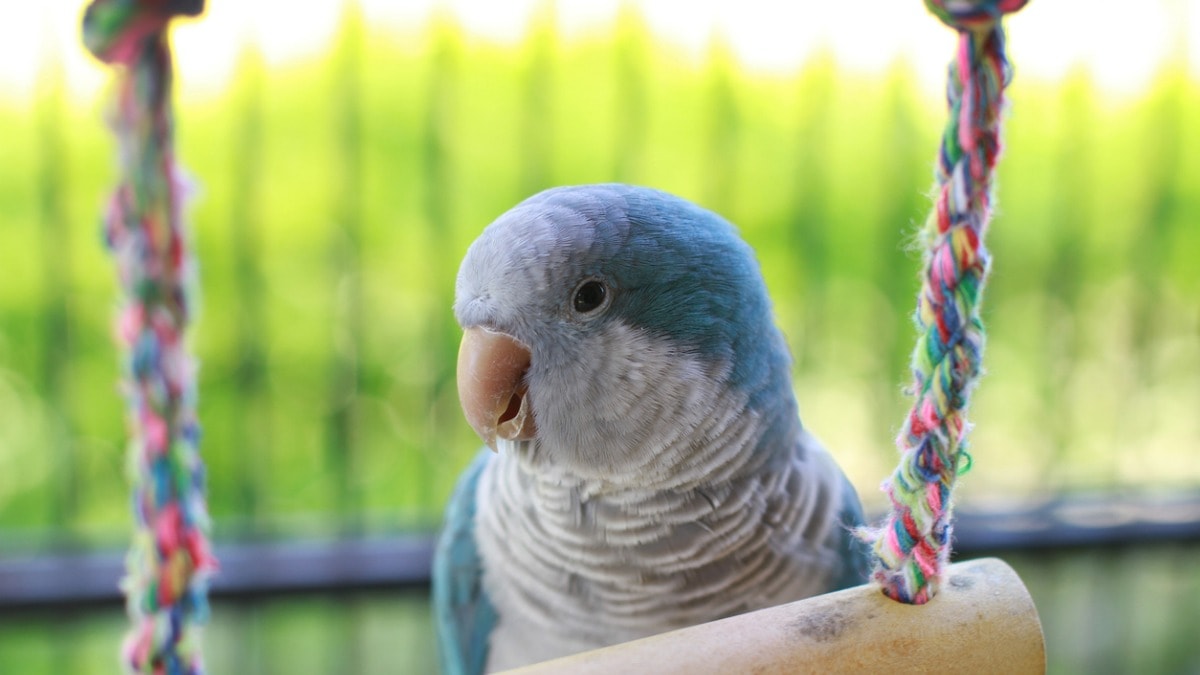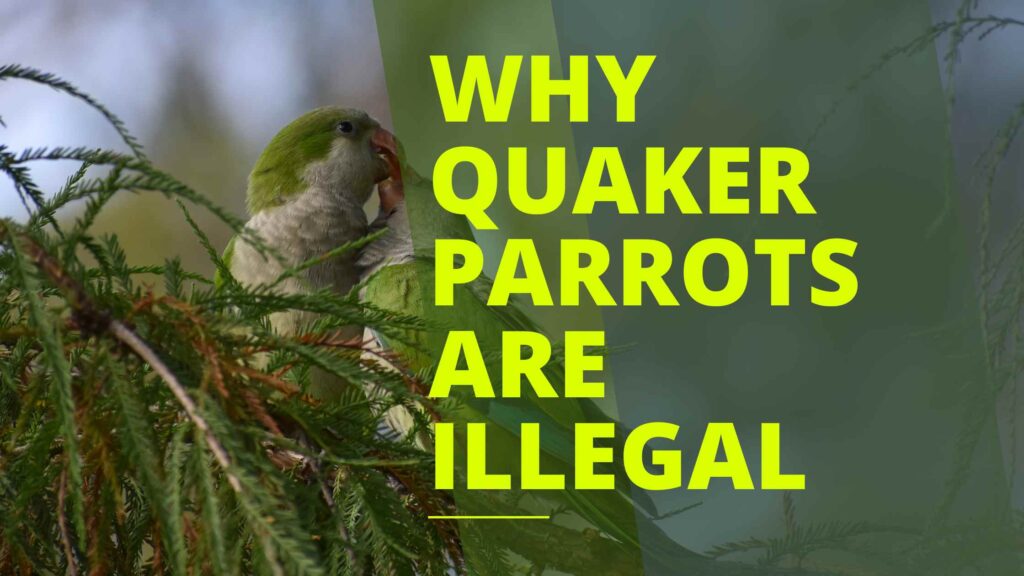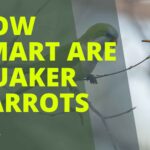Quaker parrots are illegal in some areas because they may threaten local ecosystems. These birds can become invasive species, outcompeting native wildlife for resources.
Understanding the legal status of Quaker parrots, also known as monk parakeets, is crucial for potential pet owners and environmentalists alike. These small, bright green parrots are known for their high intelligence and social nature, which make them popular in the pet trade.
Why Quaker Parrots are Illegal? Yet, the same qualities that endear them to bird enthusiasts can pose significant risks to agricultural practices and natural habitats. Due to their incredible adaptability and prolific breeding, Quaker parrots can establish large feral populations that disrupt local fauna and flora.
This concern leads many regions to impose restrictions or outright bans on their ownership. Before considering a Quaker parrot as a pet, it is essential to check the regulations in your area to ensure compliance with wildlife conservation efforts and avoid legal complications.
The Legality Of Exotic Pets
Owning an exotic pet comes with unique responsibilities. Legal restrictions often play a critical role. This is crucial for preserving biodiversity and protecting public safety. One such pet impacted by these laws is the Quaker Parrot.
Varied Laws Across Regions
In the world of pet ownership, laws vary widely. Regional legislation dictates what animals someone may keep. Quaker Parrots are illegal in some areas due to the potential for ecological impact or noise disturbance.
- California: Bans many exotic pets, including Quaker Parrots.
- New Jersey: Permits Quaker Parrots with certain restrictions.
- Colorado: Has a banned species list that includes some parrot species.
Exotic Species Under Scrutiny
Quaker Parrots fall under scrutiny for several reasons. They are invasive species. They can disrupt local ecosystems. They compete with native species for resources. They can spread diseases to local bird populations.
Protective laws ensure a balance between pet ownership and ecological protection. Interested owners should check with local wildlife authorities before considering an exotic pet like the Quaker Parrot.
Quaker Parrots At A Glance
Quaker Parrots, also known as Monk Parakeets, are small, vibrant birds that have captured the hearts of avian enthusiasts worldwide. Their unique personalities, coupled with a remarkable ability to mimic human speech, make them stand out in the parrot family. Yet, in some places, they face legal restrictions. Let’s delve into the intriguing world of these charming birds.
Features And Behavior
Quaker Parrots are known for their distinctive green plumage and greyish breast. They boast a playful demeanor and are highly sociable. With proper training, they develop strong bonds with their owners. Below is an overview of their key features:
- Average length: 11-12 inches
- Weight range: 90-150 grams
- Expected lifespan: 20-30 years with proper care
- Speech ability: Excellent mimics of human speech
| Condition | Average Lifespan |
|---|---|
| Wild | 15-20 years |
| Captivity (with care) | 20-30 years |
| Captivity (neglected) | 5-10 years |
Their intelligence often leads them to engage in complex play, which includes solving puzzles and interacting with various toys. This playfulness is an essential part of their behavioral enrichment.
Natural Habitats
Quaker Parrots originate from the temperate to subtropical regions of Argentina and the surrounding countries in South America. They adapt well to various climates which has enabled them to thrive in urban areas far from their native lands. Here are some aspects of their habitats:
- Climates: Temperate to subtropical
- Environment: They prefer open woodlands, parks, and urban settings
- Natural diet includes seeds, fruits, vegetables, and grains
In urban environments, Quaker Parrots often build large, communal nests. These nests can withstand harsh weather, thanks to the birds’ intricate construction skills. The adaptability of Quaker Parrots unfortunately contributes to their invasive status in regions outside their native range. This can lead to conflicts with local ecosystems and human activities, influencing their legal status in various areas.
A History Of Restrictions
The story of why Quaker parrots are illegal in some areas is quite fascinating. These bright and sociable birds, also known as monk parakeets, have been the subject of debate for decades. Concerns about their impact on ecosystems and economies led to regulations. Let’s delve into how initial fears have brought about strict measures to control the Quaker parrot population.
Initial Concerns
Quaker parrots became a topic of interest for government agencies in the 1960s and 1970s. Native to South America, these birds adapt well to different environments. In the wild, they build large communal nests that can cause issues. Electrical power disruptions and damage to infrastructure have been linked to these nests. Additionally, they are agricultural pests, threatening crops and native species.
Widening Legal Measures
As their numbers grew, so did the scope of legal restrictions. Diverse states in the US began classifying Quaker parrots as invasive. This led to prohibitions on their import, sale, and ownership. Agencies such as the USDA and the US Fish and Wildlife Service highlighted the risks. This prompted stricter laws. Education campaigns and removal programs followed to control their spread. The bird’s ability to survive in urban areas only sped up these legal actions.

Credit: be.chewy.com
Invasive Species Concerns
The charming and sociable Quaker parrot, also known as the Monk parakeet, has gained notoriety beyond its endearing qualities. In some regions, Quaker parrots are illegal due to invasive species concerns.
Invasive species can threaten indigenous wildlife and disrupt local ecosystems. Quaker parrots, with their adaptable nature and capability to create large, communal nests, have become a subject for strict regulations.
Impact On Local Ecosystems
Quaker parrots can fundamentally alter the environments they invade. Their presence may lead to unexpected consequences for native flora and fauna.
- Competition: They compete with native birds for food and nesting sites.
- Predation: Some may prey on native species.
- Disease: They can introduce diseases to which native species have no immunity.
Examples From The Wild
In areas like the US and Europe, Quaker parrots have established wild populations. Success stories for the birds might mean trouble for ecosystems.
| Region | Impact |
|---|---|
| Brooklyn, NY | Damage to utility structures and interference with power supplies. |
| Madrid, Spain | Disrupting native species by dominating resources. |
| London, UK | Nesting on power stations, causing outages. |
These are just a few instances where Quaker parrots impact local ecosystems and demonstrate the reality behind their ‘invasive species’ label.
Agricultural Threats Posed
Quaker parrots, also known as monk parakeets, have a complex relationship with agriculture. While adorable and intelligent, these birds pose significant threats to crops and ecosystems. This section delves into the reasons behind their illegal status in various regions, especially due to the potential harm they can cause to agriculture. Let’s explore these issues further.
Crop Damage
Quaker parrots are known for their hearty appetites and feeding habits that can wreak havoc on farmland. They typically feed on a variety of fruits, vegetables, and grains, leading to:
- Devoured Harvests: Fields of crops can be stripped bare by flocks.
- Mutilated Plants: Young seedlings and trees may never recover from parrot feasting.
- Severe Infestations: Once a location is targeted by parrots, they tend to return, causing recurring damage.
Economic Implications
The impact of Quaker parrots on agriculture extends beyond just the physical destruction of crops. The economic implications are considerable:
| Aspect | Consequence |
|---|---|
| Rising Costs | Increased spending on pest control and crop protection. |
| Lost Income | Farmers face reduced yields and potential market deficits. |
| Regulatory Actions | Stricter laws and penalties can escalate management expenditure. |
These birds can indirectly burden taxpayers, escalate food prices, and lead to farmers facing financial struggles. Protecting agriculture from Quaker parrots is essential to maintain a stable economy within the farming sector.
:strip_icc()/facts-about-quaker-parrots-390854_final-resized-4ef3394617c848fdb8e27f7d8d12dda8.jpg)
Credit: www.thesprucepets.com
Disease Transmission Issues
Why might Quaker Parrots be illegal? One main concern is disease. These birds can carry and spread diseases dangerous to humans and other birds. This fear leads to strict laws in some places. Now, let’s explore the risks linked to avian diseases.
Avian Diseases
Parrots, including Quakers, can carry hidden diseases. They might look healthy but still spread sickness. Without showing signs, these birds can transmit diseases to humans, like Psittacosis. This illness can cause fever, headache, and pneumonia in people. Regular vet checks are vital to spot any signs early.
- Psittacosis (Parrot Fever)
- Avian Influenza
- Beak and Feather Disease
Risks To Other Bird Populations
Quaker Parrots pose threats to local birds too. They can share diseases, harm the natural balance, and outcompete native species for food and nests. Protecting native birds is crucial.
| Threat | Impact on Native Birds |
|---|---|
| Disease Spread | Decline in health and numbers |
| Competition | Reduced resources for locals |
| Habitat Alteration | Changes in the local ecosystem |
Legal Implications For Owners
Understanding the legal landscape is crucial for prospective and current owners of Quaker parrots. These birds are illegal in certain regions. Let’s delve into the potential consequences and risks associated with owning a Quaker parrot in areas where they are banned.
Penalties And Fines
Owners caught with Quaker parrots may face harsh penalties. These can range from hefty fines to legal charges. Authorities impose these fines to deter illegal possession and breeding. The cost can vary broadly depending on location and the severity of the offense. Fines may escalate for repeated violations.
- First-time offense: A fine that could start at a few hundred dollars.
- Repeat offenses: Potential for thousands of dollars in fines.
Confiscation Risks
Owning a Quaker parrot illegally comes with the risk of confiscation. If discovered, authorities have the right to remove the bird from your care. This separation can be stressful for both the bird and the owner. In some cases, the bird may be relocated to a sanctuary or rehomed.
| Outcome | Potential Next Steps for Confiscated Birds |
|---|---|
| Sanctuary | Birds may live out their lives in a protected environment. |
| Rehoming | Birds could be given to legal owners or facilities. |
Understanding and respecting local wildlife laws is essential for the wellbeing of the birds and owners. When considering a Quaker parrot as a pet, always check local regulations first.
Conservation Efforts And Ethics
When we discuss wildlife and pets, both conservation and ethics become crucial. For Quaker Parrots, legal restrictions aim to protect both the environment and the species. Understanding why Quaker Parrots are illegal requires a look at ongoing efforts to safeguard ecosystems and uphold ethical treatment. These vibrant birds, also called Monk Parakeets, have a complex history with humans, leading to critical conservation measures.
Rehabilitation Programs
Rehabilitation programs play a pivotal role in Quaker Parrot conservation. By caring for injured or confiscated parrots, these initiatives work tirelessly to reintroduce them into their natural habitats. Such efforts help maintain ecological balance and discourage illegal pet trade. Programs utilize cutting-edge techniques to ensure birds return to the wild with a strong chance of survival, contributing to both species preservation and ecosystem health.
- Emergency care for injured parrots
- Training for survival in the wild
- Monitoring released birds for success
Responsible Pet Ownership
Responsible pet ownership is essential when considering a Quaker Parrot as a companion. Education about their needs, longevity, and potential to become invasive is crucial. Owners must commit to ethical care, which includes providing ample space, proper diet, and mental stimulation. Laws against ownership often stem from concerns over unprepared owners releasing birds, which can lead to feral populations that threaten local wildlife. By encouraging responsible ownership, we aim to reduce such risks.
| Required Care | Considerations |
|---|---|
| Ample Space | Must mimic natural environment |
| Proper Diet | Specially formulated for Quaker Parrots |
| Mental Stimulation | Toys, puzzles, and interaction |
Alternatives To Quaker Parrots
Many bird lovers find themselves drawn to the colorful and social Quaker Parrot. But these birds can be a tough find. Some places make it tough to own them. Don’t worry, though! Plenty of other feathered friends make fantastic pets. Let’s dive into the world of legal pet birds and why they’re great alternatives to the Quaker Parrot.
Legal Pet Birds
Finding the right bird is a breeze with so many choices. Here’s a list of birds that are friends with the law and ready to come home with you:
- Budgerigars – Small, colorful, and full of fun.
- Cockatiels – Charming companions with a mohawk.
- Lovebirds – Tiny bundles of joy and affection.
- Finches – Petite, peaceful, and pretty to look at.
- Canaries – Known for their sweet song and rainbow of colors.
Benefits Of Domestic Species
There’s a bundle of perks when you opt for a domestic bird species. Check these out:
| Ease of Care | Social Needs | Availability |
|---|---|---|
| Most are easy for new owners. | A variety to match your lifestyle. | Easy to find in pet shops. |
This means less hassle for you and a happy home for your new pet.
Changing Legal Landscapes
As we navigate the changing legal landscapes concerning pet ownership, Quaker Parrots fall into a particularly complex category. These birds, known for their vibrant personalities and mimicking abilities, face legal restrictions in some areas. Let’s dive into the recent updates and the collective efforts to reshape their legal status.
Recent Law Amendments
Recent years have witnessed a shift in how different regions approach the legality of Quaker Parrots. What stirs the legal pot? Mostly, these amendments revolve around:
- Environmental concerns: Unchecked populations might harm native species.
- Agri-business interests: These birds can impact crop production.
- Wildlife balance: Free-roaming Quakers can disrupt local ecosystems.
One notable case involved New Jersey transitioning from a ban to regulated ownership. This legislative move became possible due to persistent research and talks highlighting the minimal environmental impact when responsible ownership is encouraged.
Advocacy And Awareness
Legal changes often stem from dedicated advocacy and increased public understanding of the issues at hand. Key efforts include:
- Organizations educating potential Quaker Parrot owners on responsible pet care.
- Studies demonstrating the species’ adaptability and negligible threat when managed.
Advocates also argue the emotional bonds formed with these pets, spotlighting their intelligence and affectionate nature.
Through fostering environmental education and sharing success stories of Quaker Parrots in captivity, the public perception shifts more favorably, affecting legal positions.
Conclusion
Understanding the legality of Quaker parrots is essential. Their potential to harm local ecosystems and agriculture leads to strict regulations. Before considering a Quaker parrot as a pet, research your local laws. By doing so, you’ll be respecting biodiversity and acting responsibly towards your environment.
Always choose pet ownership with awareness and care.
Ryan Everhart is a passionate bird enthusiast and blogger, primarily writing on his website, Avian Whispers. His journey into the world of bird blogging began with a deep interest in parrots, a species that captivated his attention for their intelligence and social behavior. Over time, his content expanded to cover a broader range of bird species, offering insights into bird behavior, care, habitats, and conservation.
Ryan is dedicated to educating his audience, which includes both new bird owners and seasoned enthusiasts. His writing is filled with personal experiences, expert knowledge, and practical advice on bird care. Through Avian Whispers, he aims to foster a deeper appreciation for birds, emphasizing their role in nature and the joys of having them as pets.
Starting with articles focused on parrots, Ryan’s work now encompasses a diverse range of topics such as feeding, training, habitat enrichment, and bird health. His love for birds extends beyond parrots, diving into various avian species. His informative and heartfelt writing reflects his commitment to the well-being of birds and the desire to help others connect with these creatures.
As a growing voice in the bird blogging community, Ryan strives to provide a platform where bird lovers can learn, share experiences, and connect over a shared passion for avian life. His blogs are not only educational but also serve as a reminder of the importance of protecting and nurturing the bond between humans and birds.




